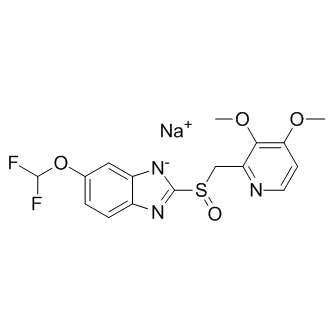
Pantoprazole sodium
CAS No. 138786-67-1
Pantoprazole sodium( SKF-96022 sodium )
Catalog No. M11610 CAS No. 138786-67-1
A proton pump inhibitor that inhibits gastric acid secretion; works on gastric parietal cells to irreversibly inhibit (H+/K+)-ATPase function and suppress the production of gastric acid.
Purity : >98% (HPLC)
 COA
COA
 Datasheet
Datasheet
 HNMR
HNMR
 HPLC
HPLC
 MSDS
MSDS
 Handing Instructions
Handing Instructions
| Size | Price / USD | Stock | Quantity |
| 100MG | 45 | In Stock |


|
| 200MG | 61 | In Stock |


|
| 500MG | Get Quote | In Stock |


|
| 1G | Get Quote | In Stock |


|
Biological Information
-
Product NamePantoprazole sodium
-
NoteResearch use only, not for human use.
-
Brief DescriptionA proton pump inhibitor that inhibits gastric acid secretion; works on gastric parietal cells to irreversibly inhibit (H+/K+)-ATPase function and suppress the production of gastric acid.
-
DescriptionA proton pump inhibitor that inhibits gastric acid secretion; works on gastric parietal cells to irreversibly inhibit (H+/K+)-ATPase function and suppress the production of gastric acid; inhibits autophagy and increases the toxicity of docetaxel in vitro and in vivo.Ulcer Approved(In Vitro):Pantoprazole sodium (BY1023 sodium; 1-10000 μM) leads to concentration-dependent increases in endosomal pH in EMT-6 and MCF7 cells.Pantoprazole sodium can block exosome release. Pantoprazole sodium inhibits the activity of V-H+-ATPase and impaires the ability of tumour cells (melanomas, adenocarcinomas, and lymphoma cell lines) to acidify the extracellular medium(In Vivo):Pantoprazole sodium (BY1023 sodium; 200 mg/kg; IP; once a week for 3 weeks) significantly increases tumor growth delay of MCF-7 xenografts combined with Doxorubicin.Pantoprazole sodium (0.3-3 mg/kg, p.o.) dose-dependently decreases both basal acid secretion in pylorus-ligated rats and the stimulated acid secretion induced by mepirizole in acute fistula rats.
-
In VitroPantoprazole sodium (BY1023 sodium; 1-10000 μM) leads to concentration-dependent increases in endosomal pH in EMT-6 and MCF7 cells.Pantoprazole sodium can block exosome release. Pantoprazole sodium inhibits the activity of V-H+-ATPase and impaires the ability of tumour cells (melanomas, adenocarcinomas, and lymphoma cell lines) to acidify the extracellular medium.
-
In VivoPantoprazole sodium (BY1023 sodium; 200 mg/kg; IP; once a week for 3 weeks) significantly increases tumor growth delay of MCF-7 xenografts combined with Doxorubicin. Pantoprazole sodium (0.3-3 mg/kg, p.o.) dose-dependently decreases both basal acid secretion in pylorus-ligated rats and the stimulated acid secretion induced by mepirizole in acute fistula rats. Animal Model:Mice bearing MCF-7 or A431 xenografts Dosage:200 mg/kg Administration:IP; once a week for 3 weeks; alone or 2 hours before Doxorubicin (6 mg/kg i.v.)Result:Showed even greater growth delay of MCF-7 xenografts with Doxorubicin compared with the single-dose combination. Significantly increased tumor growth delay with a single dose with Doxorubicin.
-
SynonymsSKF-96022 sodium
-
PathwayMembrane Transporter/Ion Channel
-
TargetProton Pump
-
RecptorHIF-1α|prontonpump
-
Research AreaOther Indications
-
IndicationUlcer
Chemical Information
-
CAS Number138786-67-1
-
Formula Weight405.3516
-
Molecular FormulaC16H14F2N3NaO4S
-
Purity>98% (HPLC)
-
SolubilityH2O: ≥ 35 mg/mL
-
SMILESCOC1=C(C(=NC=C1)CS(=O)C2=NC3=C([N-]2)C=CC(=C3)OC(F)F)OC.[Na+]
-
Chemical Name1H-Benzimidazole, 6-(difluoromethoxy)-2-[[(3,4-dimethoxy-2-pyridinyl)methyl]sulfinyl]-, sodium salt (1:1)
Shipping & Storage Information
-
Storage(-20℃)
-
ShippingWith Ice Pack
-
Stability≥ 2 years
Reference
1. Tan Q, et al. Br J Cancer. 2015 Mar 3;112(5):832-40.
2. Feng S, et al. Oncol Rep. 2016 Dec;36(6):3207-3214.
3. Zeng X, et al. Oncotarget. 2016 Apr 19;7(16):22460-73.
molnova catalog



related products
-
Pumaprazole
Pumaprazole is an antagonist of a reversible proton pump.
-
Rabeprazole Related ...
Rabeprazole is an antiulcer drug in the class of proton pump inhibitors.
-
Esomeprazole magnesi...
A proton pump inhibitor that reduces stomach acid secretion by inhibition of the H+/K+-ATPase in the parietal cells.



 Cart
Cart
 sales@molnova.com
sales@molnova.com


